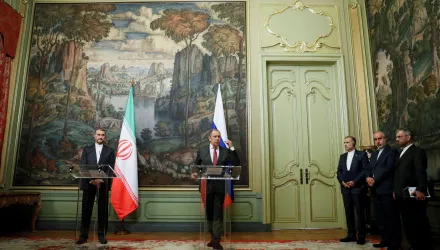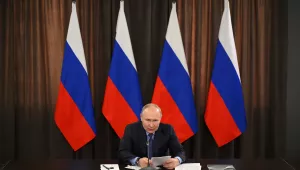Testimony on U.S. Sanctions Against the Russian Federation
Senate Committee on Banking, Housing and Urban Affairs
Ambassador (ret) R. Nicholas Burns
April 27, 2017
Mr. Chairman and Ranking Member Brown, it is an honor to testify before the Senate Committee on Banking, Housing and Urban Affairs on United States sanctions against the Russian Federation.
The United States should maintain sanctions on Russia due to its continued aggression in Ukraine. The Congress and the Trump Administration should now also consider additional sanctions over the Russian government’s interference in the 2016 U.S. Presidential elections.
Russia is the most dangerous U.S. adversary in the world today. For more than a decade, Russian President Vladimir Putin has used the power of the Russian state to undermine American interests in Europe, the Middle East and now in the heart of our democratic system here in the U.S.
Russia is attempting to undermine the democratic peace in Europe that the United States helped to bring about after the dissolution of the former Soviet Union and communism in Eastern Europe a quarter century ago. In August 2008, Russia invaded Georgia and has kept that country divided since. Russia has imposed a false territorial conflict in Moldova. In 2014, Russia invaded and then annexed Crimea, violating the territorial integrity of Ukraine. This was the first outright theft in Europe of one country’s sovereign territory by another since the Second World War.
Russia has helped to instigate, fund and arm an insurrection against the Ukrainian government in Eastern Ukraine through the continued presence of Moscow’s military forces in that region. Russia has also attempted to undermine the internal stability of our NATO allies, Estonia, Latvia and Lithuania.
To the south and west of the Russian Federation, Putin has acted to undermine neighboring states and to gain effective control over their futures so that they may not seek closer ties to either the European Union or NATO. He wants to attain what the Tsars and Stalin sought in the past—strategic depth along his borders to separate Russia from the West. In this regard, he views the United States as his most serious competitor for power and influence in Europe. He understands that the United States, as the leader of NATO, is the pivotal country in organizing an effective defense against his plan to expand Russia’s sway in Eastern Europe.
In response to Russia’s invasion of Ukraine, President Obama was right to join European countries and Canada in imposing economic sanctions on Russia in 2014. The Trump Administration should not lift those sanctions until all the provisions of the Minsk agreements have been implemented fully.
These sanctions are a critical component of the ability of the U.S. to counter Russia in Europe and to assist those European countries that are victims of Russian aggression. Helping to create a free, united and democratic Europe has been one of America’s most important and historic global objectives for a century. The United States fought in the First World War, World War Two and during the long decades of the Cold War to secure freedom in Europe.
Putin has now put that all at risk. Europe has been divided again by his illegal actions. It is thus a vital national interest of the United States to contain Russian power in Eastern Europe. Sanctions are one of the principal tools the U.S. and Europe have to ensure the success of this common strategy.
Russia’s clear interference in the American Presidential election in 2016 should also strengthen our determination to undercut Putin’s ambitions and to raise the costs to his government of this unprecedented assault on American sovereignty. The U.S. Intelligence Community report to the country in January was unequivocal. Russia attempted to undermine the credibility of our 2016 election by intervening through a variety of nefarious means.
This is a blatant, unprecedented and deadly serious attack on our democracy. Vigorous investigations by the FBI and the Senate and House Intelligence Committees are necessary to unearth the full truth of this attack on our electoral system. It also warrants a response from the Congress by the imposition of further and stronger sanctions in addition to those already in place.
The United States must respond swiftly and with conviction or Putin’s government will only be encouraged to continue its campaign to undermine our democracy and those of our allies. Indeed, there is ample evidence that Moscow has already been interfering in the Dutch, French and German elections this year on behalf of extreme anti-democratic populist parties. Russian Television, Sputnik and other organs of the Russian state have been dispersing fake news, misleading articles and outright lies about those democratic leaders in Europe that oppose Russian policies. The Russians will very likely continue these activities unless we work together with the European Union to impose substantial costs on them for doing so.
The response by President Trump to Russia’s actions has been extremely disappointing.
President Trump has repeatedly contested the judgments of the intelligence community and of the FBI on this issue.
He has downplayed the need for investigations by the Congress. He has or dered no serious investigation of his own and has not demonstrated any sense of urgency to discover the extent of Russia’s interference in our election. He has failed to criticize President Putin for this brazen attack on our democracy. Based on my experience working for Republican and Democrat Presidents on Russia, I cannot imagine any of President Trump’s predecessors adopting such a weak approach on such a grave national security challenge.
One of President Trump’s fundamental responsibilities as President is to defend our country from foreign aggression. He has failed to do so in not responding to a serious attempt to undermine American democracy.
That is why Congress must now act by undertaking a comprehensive, bipartisan investigation of Russia’s actions and by adopting a far stronger and more forceful response than the Trump Administration has to date. Indeed, a recent NBC/Wall St. Journal poll showed that 73 percent of the American respondents supported an independent investigation into this attack.
With this in mind, I support many of the goals of the proposed bipartisan Russia Sanctions Review Act of 2017. Congress should consider imposing more comprehensive sanctions on Russia to build on the cyber sanctions initiated by President Obama in late December 2016.
At the very least, the President and Congressional leaders must make clear directly to the Russian government that interference in our elections or attacks on our critical infrastructure will not be tolerated by the United States. We must warn that the U.S. will retaliate further if these attacks continue. And we should coordinate our response with our key allies to maximize its impact.
The U.S. has every right to sanction those Russian individuals and firms who have carried out hacking attacks during our election campaign on behalf of the Russian government. But, the far greater challenge is to decide how to respond to hacking attacks, the use of false information, fake news sites and other interference by the Russian state itself. Depending on the results of the FBI and Congressional investigations, our response must be forceful and unmistakable in our determination to deter future attacks.
As a career Foreign Service Officer, I worked for three American Presidents as they sought to respond to challenges from Russia. From 1990 until 1995, I served in the Administration of President George H.W. Bush as Director for Soviet Affairs at the National Security Council and then in the Administration of President Bill Clinton as Special Assistant to the President and Senior Director for Russia, Ukraine and Eurasian Affairs.
During the Administration of President George W. Bush when I was Ambassador to NATO (2001-2005) and Under Secretary of State for Political Affairs (2005-2008), I worked extensively on our often difficult relationship with the Russian Federation. While we cooperated reasonably well with the Russian government for a time after the 9/11 attacks, President Putin eventually adopted a much more aggressive, competitive and distrustful attitude toward the U.S. and Europe. Our relationship with Moscow has suffered as a consequence.
All three Presidents worked within a carefully constructed and bipartisan strategic framework that emphasized the freedom and security of our allies and friends in Europe as a primary priority. President Trump has not made these principles a point of emphasis in his first months in office. He is the first American president in seven decades who has not made clear his unequivocal commitment to NATO and the European Union and to the preservation of democratic governments in Europe. He has been reluctant to embrace U.S. leadership of the NATO Alliance. He has been even more lukewarm on our historic support for European integration. Just last week, he made laudatory comments about the French anti-democratic populist, Marine Le Pen. This is an abrupt and misguided departure from seven decades of resolute American policy in support of democratic governments in Europe.
Congress must thus remain vigilant on the issue of U.S. sanctions against Russia over its outright violation of Ukraine’s sovereignty. Congress should make it difficult for the Trump Administration to lift sanctions without Congressional concurrence. And if the Russian-supported separatist forces continue to expand their territorial control in Eastern Ukraine, Congress should consider adding sanctions in response. A December 2016 report by the Atlantic Council (where I am a board member) details a variety of options from strengthening sanctions on key individuals in the Russian government to expanding financial sanctions, including in energy. It would also be beneficial for Congress to request from the Trump Administration a full accounting of Russia’s ongoing violations of the Minsk accords during recent months.
I am neither an economist nor a sanctions expert and am thus not in a position to judge the precise impact of the sanctions on the Russian economy to date. Many experts believe lower world oil prices have been the main factor contributing to Russia’s negative economic growth during this period. But, many also believe sanctions have had an impact in helping to slow Russia’s GDP growth rate and robbing its economy of badly needed investment capital in energy and other areas.
Sanctions have not been sufficiently robust to cause the Russian government to withdraw its military forces from Crimea and Eastern Ukraine. But, the sanctions have isolated Russia internationally and have been a unifying factor in galvanizing western opposition to Putin and in ensuring non-recognition of Russia’s land grab in Ukraine.
The fact that Putin and his government have worked so hard to have the sanctions lifted is an indication that they are a cause of great concern for Moscow. The Russian government continues to attempt to divide the European Union on this issue. German Chancellor Angela Merkel has been the key leader in insisting that Russia meet all of its Minsk agreement commitments before sanctions can be lifted. She deserves our full support in maintaining unanimity within the EU in the months ahead.
As Congress debates the right mix of sanctions in response to Russia’s actions in Ukraine as well as its interference in our elections, it will be important to integrate U.S. sanctions with those of Canada and the European Union. Congress should request a full report on sanctions implementation by the U.S. and all the other countries to ensure they are being carried out in a rigorous manner. The U.S. would be right to insist that the sanctions also be equitable on both sides of the Atlantic so that the sacrifices made by European companies are equal to those being made by American companies.
Sanctions are the main tool the U.S. and Europe can employ to send a message of tough opposition to Russia’s territorial aggression in Eastern Europe. When Russian military forces entered Crimea and then Eastern Ukraine in early 2014, President Obama, Chancellor Merkel and other allied leaders made the right decision not to use military force in response. As Ukraine is not a member of NATO, we had no legal or ethical obligation to do so. And military force would have created a dangerous confrontation between two nuclear weapons powers. Sanctions were the only effective way the U.S., Canada and Europe could respond forcefully to Putin and inflict economic damage that might, over time, cause him to rethink his strategy.
For now, however, Russia is far from compliance with the Minsk accords. During the last three months alone, Moscow has instigated more intensive fighting by the separatist movements it supports directly. Indeed, the Russian government took an unprecedented step earlier this year of treating passports of the separatist government in the Donbass region as legitimate. It has even acquiesced in the use of the Russian ruble in territory that clearly belongs to Ukraine under international law. The trends are both obvious and ominous in Ukraine, Moldova and Georgia—Russia is attempting to subvert the independence of all three countries.
The U.S. must now mount a renewed strategy to combat this dangerous Russian campaign. The first step is for the Administration to maintain and possibly increase sanctions on Russia. A second step is for Congress and the Administration to agree to provide lethal defensive arms to Ukraine so that it can defend its people and its borders. A third step is to make permanent the recent stationing of NATO military forces on the territory of Poland, Estonia, Latvia and Lithuania. Finally, the Trump Administration should also continue the policy of President Obama to rebuild the strength and armored capacity of U.S. military forces in Europe as a deterrent to Putin’s truculent behavior.
While there will be some issues where cooperation with Russia may be possible—implementation of the Iran Nuclear Deal, North Korea and counter-narcotics are examples—we will likely remain in a competitive and hostile relationship with Russia until Putin’s Soviet-trained and inspired generation passes from power some years from now.
Our long-term goal must thus be to contain Russian power in Eastern Europe to preserve, in the words of President George H.W. Bush, the “Europe whole, free and at peace” that was the historic result of the end of the Cold War in 1991.
Russia, however, is clearly attempting to rebuild its power base in Europe and the Middle East at the expense of the United States and its allies. Its brutal air campaign in Syria has resulted in the deaths of thousands of civilians. By weakening both NATO and the European Union, Moscow also hopes to undermine the credibility of our democratic systems.
Finally, Mr. Chairman, these aggressive Russian actions are a warning to the American people and our government. We must be vigilant in defending the Western values upon which our country was founded and on the Transatlantic Alliance that is critical to our long-term security.
Just as during the Cold War, Russia’s assault is focused on our concrete interests in Europe but also on the values that are at the heart of our democratic system of government. Russia is contesting the victory of the democratic countries at the end of the Cold War. Putin’s actions are a carefully coordinated power move to divide the West and reduce American power in the world.
With this in mind, I hope President Trump will speak and act more resolutely in defense of those values—freedom of speech and of the press and the separation of powers, including an independent judiciary. The United States is the natural leader of the West and is an exceptional global power. We must give confidence to the American people, as well as hundreds of millions of Europeans who are our treaty allies, that we will act to protect the freedom and independence of the western democracies against a cynical and opportunistic Russia autocrat.
We urgently need a principled, bipartisan American response, led by the Congress, to the threat of Russian attacks on our friends in Europe and on our democracy at home.
Burns, Nicholas. “Senate Testimony on U.S. Sanctions Against the Russian Federation.” April 27, 2017





